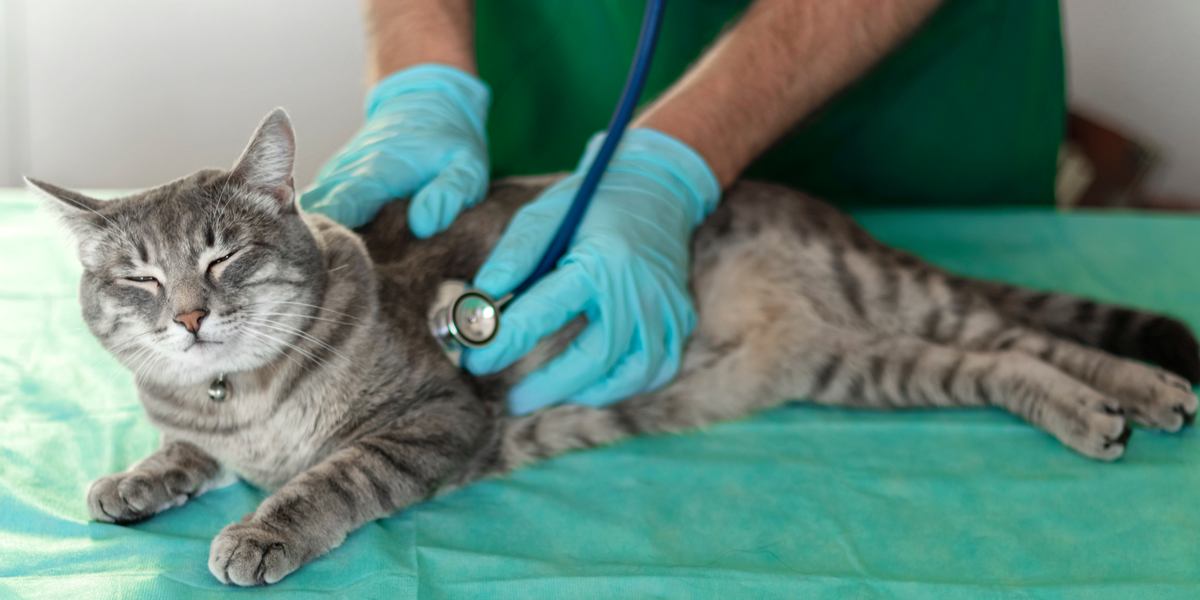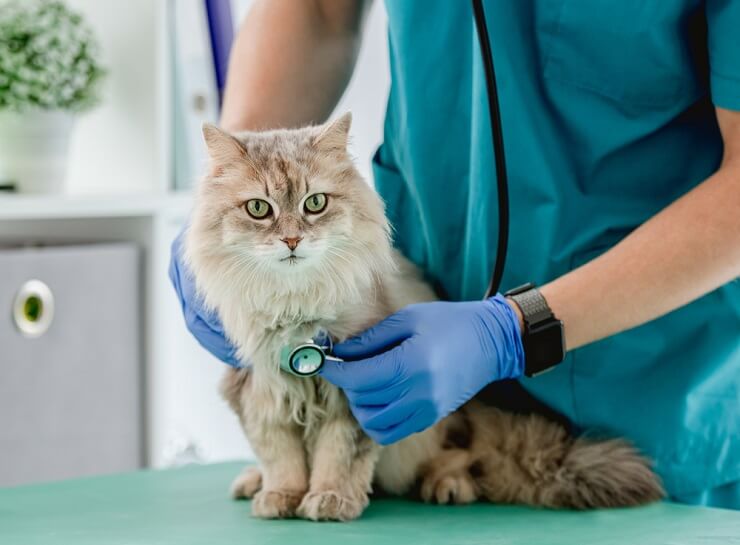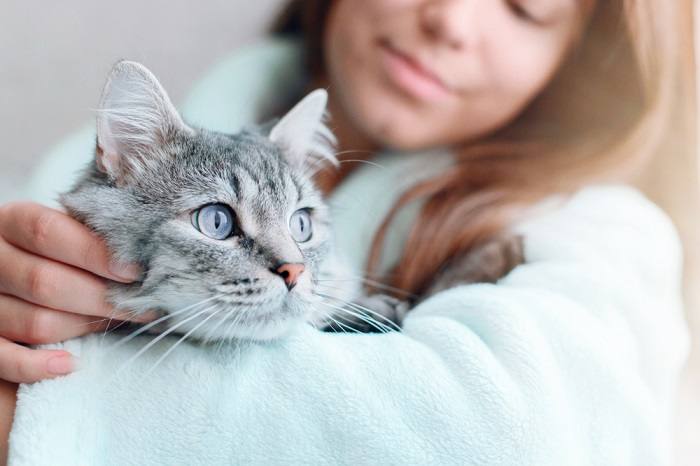
Do you know about heartworm disease in cats?
If not, continue reading as this is essential information for all cat owners to know. Heartworm disease is a serious and potentially life-threatening disease in cats in the United States and other parts of the world.
Heartworms are spread by mosquitos and can infect both outdoor and indoor cats. Prevention is crucial with this disease, as unfortunately there’s no FDA-approved or effective treatment for heartworm infection in cats.
What Is a Heartworm?
Heartworm disease is caused by a worm parasite called dirofilaria immitis. The female worms can be 6 to 14 inches long (15 to 36 centimeters) and 1/8-inch wide (3 millimeters), with males being smaller in size. That’s huge when we think of the size of the average domestic cat.
It’s common in the U.S. and other parts of the world with tropical and temperate climates. In non-affected parts of the world, it can be an issue seen in imported pets that have come from an infected area.
How Do Cats Get Feline Heartworm Disease?
Heartworm parasites are spread to cats from a mosquito bite. The mosquito gets infected with heartworm micofilariae (the baby phase of the worm) when it bites an infected animal (e.g., a dog).
After 10 to 14 days in the mosquito, the microfilariae develop into infective larvae. The infected mosquito then bites a new animal and infects them with these larvae through the bite wound. The heartworm larvae develop into adult worms in approximately six to eight months.
Heartworm disease is much more common in dogs than cats, even with animals that live in the same affected areas. Approximately 10% of cats have heartworm disease compared to that of infected dogs in the same region. This is because dogs are natural hosts for heartworm, while cats aren’t.
Dogs are natural hosts for heartworm, meaning that the parasites thrive in a dog’s body. They mature into adults, mate and reproduce, and because of this, a large worm burden can be found in dogs.
Unlike dogs, cats are atypical hosts, meaning that they’re not the ideal host for heartworm. This means that not many worms develop into adults, and as a result, many affected cats only have one to three adult heartworms. These adult worms live for two to four years in cats.
Since heartworm is spread by mosquito bites, you might be thinking that your indoor cat is safe from heartworm disease. Outdoor cats are more at risk of developing heartworm disease as they have increased exposure to mosquitos.
However, indoor cats are not safe from heartworm disease and can also develop heartworm disease from mosquitos getting indoors, cats going onto balconies, cats getting outdoors, etc. In fact, one study showed that 25% of cat heartworm disease cases occur in indoor-only cats.
How Do Heartworms Affect Cats?

If your cat is experiencing an abnormal heart rate, your veterinarian will do a complete physical exam, including listening to your cat’s heart.
Heartworms cause a lot of damage in a cat’s body. True to the name heartworm, some adult worms reside in the heart, but many worms affect the lungs and the blood vessel that carries blood from the heart to the lungs (pulmonary artery). In cats, we know that not many worms reach adulthood and often it’s the immature heartworms that can cause a lot of disease.
This is the first stage of disease. The immature worms can travel into the small arteries in the lungs and cause severe inflammation and damage here. For this reason in cats, heartworm disease primarily causes lung disease in cats. This is called heartworm associated respiratory disease (HARD).
The second stage of disease is when adult worms start dying. This can cause a severe inflammatory or anaphylactic type reaction and the physical worms can cause clots in the blood vessels. The worms can also migrate to the eyes and nervous system, causing a variety of symptoms, but lung disease would be the most common in the cat.
Clinical Signs
Heartworm disease presents with many symptoms. In cats, it often presents with respiratory signs such as coughing or wheezing, which can often be confused with feline asthma. In severe cases, there may be no signs at all until a cat collapses or even sudden dies.
Signs of heartworm disease in cats can include but aren’t limited to:
- Diarrhea
- Vomiting
- Weight loss
- Coughing
- Wheezing
- Laboured/difficult breathing (dyspnea)
- Loss of appetite
- Lethargy
- Collapse
- Chylothorax (fluid accumulation in the chest)
According to the American Heartworm Society, in rare cases symptoms such as difficulty walking, seizures, and fluid accumulation in the abdomen can also be seen.
Diagnosing Heartworm Disease
Diagnosing heartworm disease in cats is a real challenge as this disease presents very differently in cats compared to dogs. There is no perfect test and your vet may decide to perform multiple tests before confirming heartworm disease.
Your vet will take a full history initially, including whether your cat spends time outdoors or indoors, history of the heartworm prevention that your cat has had, when the symptoms started, and how they’ve progressed.
They will likely run blood tests and urine tests to check for underlying conditions or for signs of a parasite burden (a high eosinophil level on the bloods might make them more suspicious of this).
More specific tests for heartworm include:
- Antibody testing: This test will show if your cat’s immune system has been exposed to heartworm parasites. The problem with this test is that it may be positive for an active heartworm infection, but also positive for cats that have previously had heartworm and cleared the infection themselves. In this way, it’s difficult to know if the cat currently has a heartworm issue.
- Antigen testing: This test detects adult female heartworms. This is a quite useful test in dogs because they usually have a large amount of adult worms. However, cats can have few adult worms or even none, so this test might not detect heartworm disease in a cat that does have heartworms.
- Chest x-rays: An x-ray might show signs of pulmonary artery enlargement (from the presence of worms) though this is a more common finding with heartworm disease in dogs. There might be signs of inflammation in the chest, which will make your vet more suspicious of heartworm disease.
- Echocardiography: An ultrasound can sometimes show live worms in the blood vessels.
Treatment of Heartworm Disease

Using year-round heartworm prevention is the best way to keep your cat from heartworm disease.
Unfortunately there is no FDA-approved drug to treat heartworm disease in cats. The medication that is used to treat heartworm disease in dogs is toxic and potentially fatal to cats. In some cases, cats may clear the disease from their system on their own and be “cured” from the disease. Such cases require close monitoring and veterinary care in the time that it takes for their body to clear the parasite.
In other cases of heartworm disease, the cat’s body doesn’t clear the parasite and the cat will become progressively worse. There is no drug available to treat heartworm infection in cats. This means that treatment is limited and mostly supportive treatment. Supportive treatment involves prompt veterinary care during illness, potentially involving oxygen therapy and intravenous fluids, and in some cases bronchodilators, corticosteroids, and/or antibiotics.
Surgical removal of the worms under general anesthetic has been used to treat heartworm disease in some cases. However, this has its own considerable risks and would need to be discussed in detail with your vet before undertaking.
In cats, prevention is critical as there is no available treatment for the disease. Prevention involves year-round treatment. Heartworm preventatives are available in the form of spot-on topical treatments or chewable treats.
If you ask, most veterinary clinics will put you on a reminder system that alerts you when the heartworm treatment is due. It’s crucial to keep treatment up to date for your cat’s lifetime and to not miss doses. If you miss a dose, contact your vet for advice.
Summary
In summary, heartworm disease is less common in cats than dogs, but poses a serious threat when cats develop an infection. There is no approved treatment for heartworm infection in cats, and the consequences of heartworm disease can be fatal. Prevention is crucial to protecting your cat. Your veterinarian can prescribe a heartworm preventative for your cat.
Frequently Asked Questions
How long can a cat live with heartworms?
Heartworm affects individual cats differently, with some cats being able to clear the infection completely while others develop severe respiratory failure. Adult worms can live for two to four years in a cat. Survival times range from one and a half to four years in different studies, but this depends on the severity of individual cases. Heartworm disease can cause sudden death.
What are the first signs of heartworms in cats?
In some cases, there are no signs at all and your cat may suddenly collapse or even die. In other cases, the most common symptoms noticed are coughing and difficulty breathing (dyspnea).
Can heartworm in cats be treated?
There is no FDA-approved treatment for cats with heartworm infection. Treatment is focused on supportive treatment (e.g., oxygen therapy, intravenous fluids, steroids, bronchodilators, etc.). Preventative treatments are very effective and crucial for cats to avoid heartworm infection.
How likely is it for cats to get heartworm?
Heartworm is less common in cats compared to dogs, with heartworm infection approximately 10% in cats compared to that of dogs in the same area. Heartworm can occur in outdoor and indoor cats as its spread by mosquito bites.








I hit no instead of yes. This article was very helpful